This is the content of the email from us to the EU Commission a few days before the demonstration. It remained unanswered. Also, no one from the EU Commission was willing to have a conversation with us at the demonstration.
Ladies and Gentlemen,
to be quite honest, we are incredibly disappointed and appalled by the EU Commission's lack of responsibility and action regarding the climate and biodiversity crisis.
With the CAP reform in its current form, compliance with the Paris climate targets is not achievable [1]. This means that tipping points in the climate system are passed [2] and the climate catastrophe can no longer be averted [3]. This is equivalent to indescribable suffering and many deaths among humans and animals.
It can already be assumed that certain self-reinforcing processes (positive feedback loops) have been activated. Thus, the methane concentration in the atmosphere increases exponentially [4], indicating thawing of permafrost or methane from thawing ice.
The Amazon has now gone from being a climate saver to a climate killer due to human activities. The main cause is deforestation for animal husbandry, especially for soy feed imports to Europe. Moreover: from a deforestation rate of 20-25%, the Amazon can irreversibly turn into a savannah even without further human intervention. This would lead to forest fires releasing hundreds of gigatons of CO2. Currently, the deforestation rate is 17% with a strong upward trend [5].
According to the Stockolm Resilience Centre, a CO2 concentration in the atmosphere that is safe for human survival is 350 ppm [6]. In 2020, the concentration was 413 ppm. Technical solutions for the necessary sequestration are lacking, so the only option is renaturation. Enormous areas are needed for this. However, 76% of the land can be freed up by switching to a purely plant-based food system [7].
The drought of recent summers is unprecedented for Central Europe in 2,100 years [8] and will also lead to crop failures and water shortages in this country.
Perhaps even more serious than climate change is the collapse of biodiversity. We are currently in the sixth mass extinction in the history of the Earth. This mass extinction is due to humans and significantly to the way we farm [9].
It is absolutely necessary to get out of the extremely resource-intensive and environmentally damaging animal husbandry. This sounds radical, but is without alternative. An IPCC report from 2018 already called for unprecedented systemic changes ("rapid, far-reaching and unprecedented changes in all aspects of society") [10]. The days of baby steps are long gone.
We urge you, not only as citizens full of fear for the future, but also as people who care and are concerned about other people and living beings, to take a deep look at the problems. Pretended solutions often come from financially strong and influential lobby groups and in most cases contradict the recommendations of science.
Talk to us and our experts (and/or other conservation organizations). It may not yet be too late to avert or at least mitigate the disaster.
We will be back in front of your office on Thursday, March 25 from 4:30pm to 6pm.
It is about life on this planet. Together, as humanity, we must do everything we can to protect and preserve it against all odds.
Sincerely yours,
Animal Rebellion Munich
References:
[1] https://science.sciencemag.org/content/370/6517/705
[2] https://www.pik-potsdam.de/en/output/infodesk/tipping-elements/kippelemente?set_language=en
[3] https://www.pnas.org/content/115/33/8252
[4] https://www.esrl.noaa.gov/gmd/ccgg/trends_ch4/
[5] https://www.nationalgeographic.com/environment/article/amazon-rainforest-now-appears-to-be-contributing-to-climate-change
[6] https://doi.org/10.1038/461472a
[7] https://science.sciencemag.org/content/360/6392/987
[8] https://www.nature.com/articles/s41561-021-00698-0
Speeches
Dear Regional Representation of the EU Commission!
The CAP (Common Agricultural Policy) regulates the criteria on which subsidies are paid to farms. For the period 2021-2027, 365 billion euros are budgeted for farmers in the EU. Although a reform of the CAP has been negotiated, funds will continue to be allocated largely on the basis of agricultural land. There are hardly any environmental or animal welfare requirements or directional steering incentives. In November 2020, the CAP reform was adopted by the EU Parliament, i.e. the EU Council and the EU Parliament are in agreement on the legislative text.
The proposed text of the law must now be finalized in trilogue meetings consisting of representatives of the EU Parliament, the EU Council and the EU Commission. Here, the EU Commission can still intervene and even reject the bill completely. The trilogue meetings are held in secret, i.e. no one except the participants knows what is discussed there and how the participants voted. The trilogue is not expected to reach an agreement before summer 2021.
Frans Timmermans is Commissioner for Climate and has announced a rejection of the CAP reform if the final agreement is not in line with the objectives of the EU's flagship environmental policy, the European Green Deal. However, Ursula von der Leyen has testified that she would not consider a rejection.
Animal husbandry is one of the main causes of climate change and the main cause of the observable collapse of biodiversity. The payment of subsidies must therefore be linked to a reduction in livestock farming and an expansion of biocyclic-vegan agriculture. According to some studies, it will not be possible to achieve the Paris climate targets without a comprehensive restructuring of agriculture.
Only the EU Commission can still stop the disastrous CAP reform. We also see this regional representation as having a special responsibility to convey to the Commissioners that the current form of CAP reform in no way contributes to a solution of the climate and biodiversity crisis, but rather further exacerbates the problems.
Feel free to come out and talk to us. We have demands, but we also outline concrete implementation proposals and point out solutions.
Dear Regional Representation of the EU Commission!
The consumption of animal products is not necessary for humans. In Europe, there are only a few areas that would not be suitable for the cultivation of crops. Furthermore, the few areas of light pasture are not necessary for food production if enormous areas are freed up by the elimination of animal husbandry.
Animal agriculture is not a necessary component of a nutrient cycle.
It is not sustainable because it requires an enormous input of resources and at the same time imbalances various material cycles and ecosystems through the emission of metabolic products.
The negative effects include:
(1) unused carbon sinks due to land consumption.
(2) the high consumption of fresh water
(3) the high use of energy-intensive artificial fertilizers
(4) the nitrate contamination of groundwater
(5) the high emission of climate gases
(6) the acidification of ecosystems
(7) the increase of fine dust pollution
(8) the eutrophication of water bodies; and
(9) the use of pesticides.
Animal husbandry disrupts a wide variety of biogeochemical cycles, in some cases irreversibly, and thus contributes significantly to global warming and the collapse of biodiversity on land and in water bodies.
Due to high farming densities and land consumption, animal husbandry is a major cause of zoonoses and pandemics. Furthermore, it requires a high use of antibiotics and thus promotes antibiotic resistance. Thus, animal husbandry represents one of the greatest threats to global health.
Climate change and biodiversity loss are closely related and mutually reinforcing (positive feedback).
Turning away from outdated, no longer relevant traditions and a change to a purely plant-based agriculture is a logical consequence from an economic and ecological point of view and only in this way can be justified for future generations. This change can lead to new and self-sustaining employment in addition to the imperative reduction of environmental pollution and the prevention of health hazards. The framework conditions for this change must be set by the EU agricultural policy. Policymakers must create incentives for this change, especially by shifting subsidies. Lobbying associations and politics must also educate consumers about the necessity of the change and highlight the benefits.
We therefore demand:
1.) As the EU Commission, help to stop the current version of the CAP reform. All hopes are now with you.
2.) Give clear guidance to a new CAP reform. A new CAP reform must achieve a reduction in animal husbandry. First of all by reducing subsidies. In addition, however, about incentives for farmers to switch to organic vegan agriculture! The Netherlands have already demonstrated this. There are already national transformation programs.
Dear EU Commission,
we have now highlighted the problems. But we can also point out concrete solutions and measures. Here are some of them:
The central demand on politics: Create framework conditions for a continuous reduction of livestock and a change to organic-vegan agriculture
Politics must take action on both the supply side (farmers/industry) and the demand side (consumers/retailers).
Possible measures for lower animal stocks (supply side)
- Opt-out programs for livestock farmers that give them a future outside of animal agriculture (Eg.: https://www.agrarheute.com/politik/niederlande-bieten-ausstiegspraemie-fuer-tierhalter-574652)
- Unconditional purchase of stables and machinery
- Financing of rebuilding, e.g. stables into facilities for vertical farming
- Organizational support (monetary/non-monetary) for a reduction in livestock production
- Free consulting and coaching services for the switch to biocyclic vegan agriculture
- New business models for vacated grassland (Background: the grassland in Europe is anthropogenic grassland, i.e. created by deforestation. It can be easily converted back into forest => https://de.wikipedia.org/wiki/Gr%C3%BCnland).
- The areas are acquired (bought) by the state and then renaturalized / reforested to create CO2 sinks and stop the extinction of species.
- Farmers reforest. The commercial forest is then either subsidized like grassland or CO2 certificates are issued for the CO2 sinks created.
- Monetary and non-monetary support for organic-vegan agriculture
- Moratorium on new livestock facilities, e.g. via construction regulations; make conversions dependent on a reduction in livestock numbers
- Introduction of a nitrogen levy/tax to reduce overfertilization and associated emissions
- Introduction and gradual tightening of an area limit for continuously decreasing livestock numbers (LU/ha)
- An end to direct and indirect subsidies for livestock farming, in particular by restructuring the EU's Common Agricultural Policy (CAP) at the expense of direct payments, which make feed production cheap
- Import ban for animal feed
- Restriction of the export of animal food
Possible measures for a reduction of consumption (demand side)
- Tax or levy on animal foods that prices in the external costs of climate change and environmental damage
- Switch public cafeterias and canteens to plant-based menus
- End milk as a component of the EU schools program
- Transparency about the climate impact of food, including through CO2 footprints on packaging.
- Transparency through clear labeling of animal ingredients and the elimination of linguistic and pictorial euphemisms on packaging and in the advertising of animal products, up to and including advertising bans for animal-based foods
- Comprehensive, independent nutrition education and outreach, especially about the consequences of animal agriculture and the benefits of plant-based diets
Last fall, the European Parliament voted for a new seven-year Common Agricultural Policy (CAP) that will be disastrous for the climate, biodiversity and sustainable agriculture. MEPs opted to stick with "business as usual," with the largest landowners receiving the highest payments, with no environmental requirements. Given that agriculture has the greatest potential among all sectors not only to reduce greenhouse gas emissions but also to become carbon-negative, the CAP must actually be at the forefront of the "European Green Deal."
We demand a radical improvement of the current CAP in order not to further endanger environmental protection, consumer health and food security! Furthermore, this opportunity must not be missed to achieve the EU's promise of CO2 neutrality.
Our claims are supported by clear scientific data!
The first sentence on the EU's CAP website states, "The Common Agricultural Policy is about our food, the environment and the countryside."
At the moment, it seems that this self-proclaimed mission is being ignored at the expense of the lobby's profit interests. The European Union has the power and the duty to implement the necessary steps to fulfill these three tasks!
Therefore, we demand:
- The European Commission withdraws the CAP immediately!
- The new CAP stops all subsidies for the production of animal products!
These need to be leveraged to help farmers shift to plant-based solutions, especially organic-vegan agriculture. Plant-based food systems are the most efficient and least carbon intensive way to grow our food.
- The new CAP supports the restoration of natural vegetation!
This would result in temperate forests instead of managed pastures and croplands, which are currently used extremely inefficiently and destructively by animal agriculture.
This could absorb as much carbon as the EU has emitted through combustion in the last nine years!
- EU introduces measures to prevent further pandemics!
It ensures that their economic costs are factored into the production and consumption that causes them. Since most pandemics are caused by zoonotic diseases, there are the following proposals:
- Increase taxes on meat consumption!
- Classify meat production as high pandemic risk activities and remove subsidies for activities that cause land change or deforestation, which itself is mainly caused by animal agriculture.
- The EU immediately stops all imports of animal products as well as feed from the Amazon and mitigates the resulting economic damage by funding reforestation projects in the affected areas.
We call on the EU Commission and all stakeholders in the EU body politic to do everything in their power to secure a new sustainable and equitable agricultural system for a livable future for people, the planet and animals.
On October 23, 2020, the European Parliament approved Amendment 171, and if adopted by the Commission, it will have massive consequences for the plant-based food industry and the growing number of consumers who choose to buy plant-based milk, the animals that are exploited for milk, and ultimately the climate and all related human and non-human animals.
Examples that would be enforced by the proposal include:
- Informative descriptions such as "contains no milk" cannot be used for products that do not contain um... milk.
- Plant-based products cannot be labeled as an "alternative to" dairy products.
- No comparisons may be made regarding climate impacts between plant-based and dairy products. climate impacts between plant-based and dairy products must be communicated.
- Plant-based products probably cannot use the same packaging as dairy products.
- Even the creamiest plant-based product cannot be called "creamy" because the creaminess was not provided by a cow.
But ... why?
Well, the short answer is that the dairy lobby seems to think that phrases like "contains no milk" are confusing to the consumer(s). Also, how will a person understand that a product labeled "does not contain milk" really um... does not contain milk? Tricky question, isn't it, or isn't it. Because we are not completely stupid.
Various regulations are under discussion in the ongoing reform of the EU's Common Agricultural Policy. One of them is an EU regulation of December 2013 establishing a common organization of agricultural product markets. This regulation states, for example, that terms such as "milk," "cheese" and "yogurt" can only be used to describe products that come from animals. This means that combining a plant-based word such as "oats" with "milk" to describe a product is not allowed.
However, current regulations still allow plant-based products to be described as "containing no milk," "dairy-free," or "yogurt alternative" - that seems both logical and helpful to consumers, right?
Amendment 171 now seeks to extend existing restrictions to the "direct or indirect use" of protected terms that refer to dairies, all in the interest of "consumer protection." Of what, one mightn ask? Clear information?? Regardless of why people choose plant-based foods, the Ammendment will make it harder to identify and objectively compare them to dairy products. As an aside, censoring plant-based foods flies in the face of the EU's own food information legislation, which states that the main goal is to "provide consumers with clear and accessible information about food."
The EU also seems suddenly confused with the climate. Amendment 171 contradicts the EU's sustainability ambitions. The European Green Deal (which aims to make the EU carbon-neutral by 2050) highlights that current dietary patterns in the EU are unsustainable and calls for a shift to more plant-based diets, both for public health and environmental reasons. Amendment 171 is diametrically opposed to this goal, creating a huge roadblock for both consumers and the European plant-based food sector.
But!.. it's not over yet!
Even though the European Parliament voted in favor of Amendment 171 last December, there is still a chance that it will not be included in the law. Now in the next day come the final trilogue negotiations involving the European Parliament, the EU Council of Ministers and the European Commission. The Commission's own assessment has shown that no further restrictions are needed beyond what is already in place, and if the Council also supports the provision of clear information to consumers about plant-based foods, there is a chance that the proposal can be rejected for the good of all.
Once again, it's so typical...
We stand here and have to demonstrate against something that gets little media attention, has a confusing and meaningless name, and yet would massively disadvantage people, animals and the environment.
It's about "Amendment 171"..... and what is that even supposed to be?
It is an amendment that was passed by the EU Parliament last fall and would enormously limit the possibilities of information and advertising for plant-based alternatives to milk. What does it mean exactly?
So far it is anyway already forbidden by law that oat milk is also called so and must therefore be called oat drink, one has come to an arrangement with it... Now however it is to go so far that for example terms are to be forbidden such as "lactose-free" or "creamy consistency" on packing also. In addition, no pictures may be used, which look similar to milk products, just too bad that vegetable MILK looks very similar to the brutal, environmentally destructive normal milk. So that would mean that manufacturers would no longer be allowed to depict their own plant-based products on packaging because, oddly enough, they look like dairy products.
Where does this absurdity come from?
It is obviously the straw in the wind of a drowning industry that is afraid for its government-subsidized profits and therefore tries to use such unfair means to slow down its competition and thus the future.
It is ridiculous that advertising bans for tobacco products have been discussed and negotiated for years and that such a ban on something meaningful is just waved through.
We call on the EU Commission to stop this madness and to put its foot down for consumers and against the animal industry!
We also call for a reversal of the current policy and the stop of subsidies for animal products and at the same time an advertising ban on precisely meat, milk and cheese. They are not only bad for people and animals, but also an economic and environmental disaster, which is why all criteria for a ban on advertising are in place!.
Do something for the future and do not hold on to a past that harms us all! Think of future generations and their obligations from the "Green Deal" towards society and the environment!
Act now and act decisively!
Dear EU Commission,
the most absurd parts of amendment 171 get their own Speakout.
There is a discussion that the amendment may prohibit manufacturers of alternatives to dairy products from using packaging similar to that used for dairy products.
This needs to be looked at more closely...
Should oat milk be packaged in hats or maybe shoes or how is that going to work?
Yesterday a new film was introduced which deals with the destruction of the world's oceans, Seaspiracy. By the way, its production and publication was massively hindered by the fishing industry.
So how can it be that our oceans are filled up with plastic from packaging waste and at the same time the manufacturers of environmentally friendly milk alternatives are forced to use ever new packaging instead of being able to rely, for example, on a recyclable packaging, such as the returnable glass bottle. Would it really be so absurd to fill a drink that is very similar to milk also in a milk bottle ?
Second, the law seeks to prohibit the disclosure of the negative impacts of dairy products. This is a dangerous restriction of the freedom of information and again strongly hinders the possibilities for the producers and supporters of plant-based alternatives, which have significantly less bad or even good influences on the environment, humans and animals. It could go as far as blocking appropriate posts on social media....
We call on the EU Commission to stop this thoroughly harmful amendment!
Instead, they should ensure fair competition, paving the way for more efficient, healthier, and environmentally friendly products that can help combat environmental catastrophe and animal agriculture.
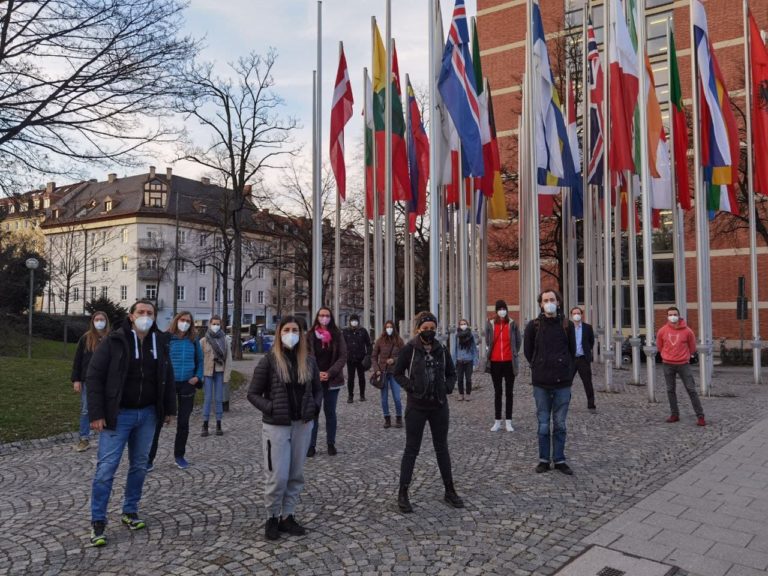
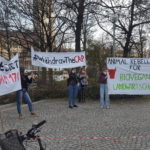
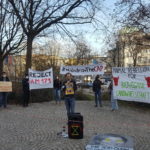
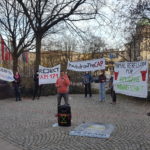
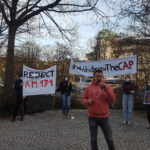

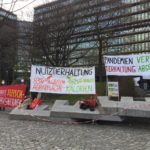
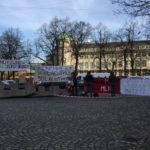
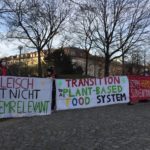
Leave a Comment
You must be logged in to post a comment.